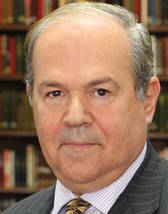Terrorism has returned to Moscow with a vengeance, as two suicide bombers blew themselves up aboard packed underground trains at the height of rush hour. According to Russian official sources, the latest toll is thirty-eight people dead, and a further sixty-five injured. And, apart from the human tragedy, the political consequences of the attack are likely to be severe.
By Jonathan Eyal, Director, International Security Studies, RUSI
First, serious questions need to be asked about the preparedness of the Russian authorities for these kinds of attacks. No government, however efficient, can preclude a terrorist outrage on a mass transit railway network such as Moscow's metro system, which regularly carries millions of passengers each day. Sniffer dogs were previously introduced into the Moscow metro, but were subsequently withdrawn largely because their effectiveness was dubious; the construction of metal detectors at the metro's entry points was considered but ultimately ruled out, partly because they would have slowed down the flow of passengers, but also because such structures could not have detected the belts of explosives which the suicide bombers used. So, the Russian state cannot be accused of failing to protect a mass transit system which, essentially, cannot be protected.
But, according to all the available evidence, the emergency procedures which were put in place after the bombers struck this morning left a great deal to be desired. By all accounts, the dead and the wounded were evacuated swiftly; the Russian Ministry of Emergency Situations - a special government department dedicated to this purpose - seems to have worked well.
Yet other procedures - such as the total shutdown of the network in the immediate aftermath of the attack - did not work at all. Inexplicably, passengers continued to be transported through the metro after the first suicide bomber struck at Lubyanka station in the heart of Moscow, thereby potentially increasing the number of casualties sustained in the subsequent blast at the Culture Park Station, which came a full forty minutes later. The procedures implemented in London after the July 2005 attacks were, therefore, not emulated in the Russian capital, despite the fact that Russian officials - including then President Vladimir Putin - were personally briefed about the emergency responses implemented in Britain, and expressed admiration for the British techniques. Why did the Moscow metro continue to operate for forty minutes after the first attack? No Russian official is prepared to hazard an answer, but the Ministry of Emergency Situations, one of the few government departments genuinely popular with ordinary Russians, is bound to face some serious questioning in the days to come. For, overall, its performance remained, at best, patchy.
And then, the Russian security services will also have to answer some awkward questions. The attack on the Lubyanka Station was evidently designed to humiliate Russia's spooks: their headquarters, in the feared building which previously housed the KGB, are just above that station. No security service can prevent all terrorist attacks, but the Russians security services seem particularly inept at foiling any terrorist attempts. Despite the fact that Russia has suffered repeatedly from a variety of terrorist attacks - the Beslan school murders, the Moscow theatre hostage drama, to name but two of the most egregious and bloody episodes - the fact remains that at no time have Russia's security services indicated that they have succeeded in penetrating the terrorist networks, or foiled any attack. And, after each episode, there was no follow-up: no accomplices were apprehended, and no analysis of the circumstances which led to the terrorist attacks was ever made public. A country which still teems with various spies and which does not seem too concerned about the legal difficulties of tapping phone conversations or following suspects seems utterly unable to break up even one terrorist network.
But by far the most important implications are political. Vladimir Putin, the Russian prime minister, initially rose to power a decade ago on a promise to 'sort out' Chechnya, and impose peace in the unruly parts of the Caucasus. Mr Putin, who has carefully cultivated a macho image, has frequently claimed to have 'smashed' the terrorists. Yet they keep on coming: the latest outrages, apparently perpetrated by two female suicide bombers, bear all the hallmarks of the previous 'Black Widow' attacks by Chechen women. Evidently, therefore, the threat of terrorism from the Caucasus was not eliminated, and it cannot be until a political solution is implemented in Chechnya.
The latest terrorist crisis comes at a particularly delicate moment for Mr Putin. His relationship with President Dmitry Medvedev is increasingly tense. The recovery of the country's economy - for which Putin bears a personal responsibility - remains fragile. And Putin's biggest supposed achievement - that of ensuring the personal safety of ordinary Russians - has now been exposed as a sham.
The terrorists who struck in Moscow this morning knew what they were doing: they reminded the country that none of Russia's lingering problems have been resolved.
The views expressed above are the author's own, and do not necessarily reflect those of RUSI.
WRITTEN BY
Jonathan Eyal
Associate Director, Strategic Research Partnerships
RUSI International

